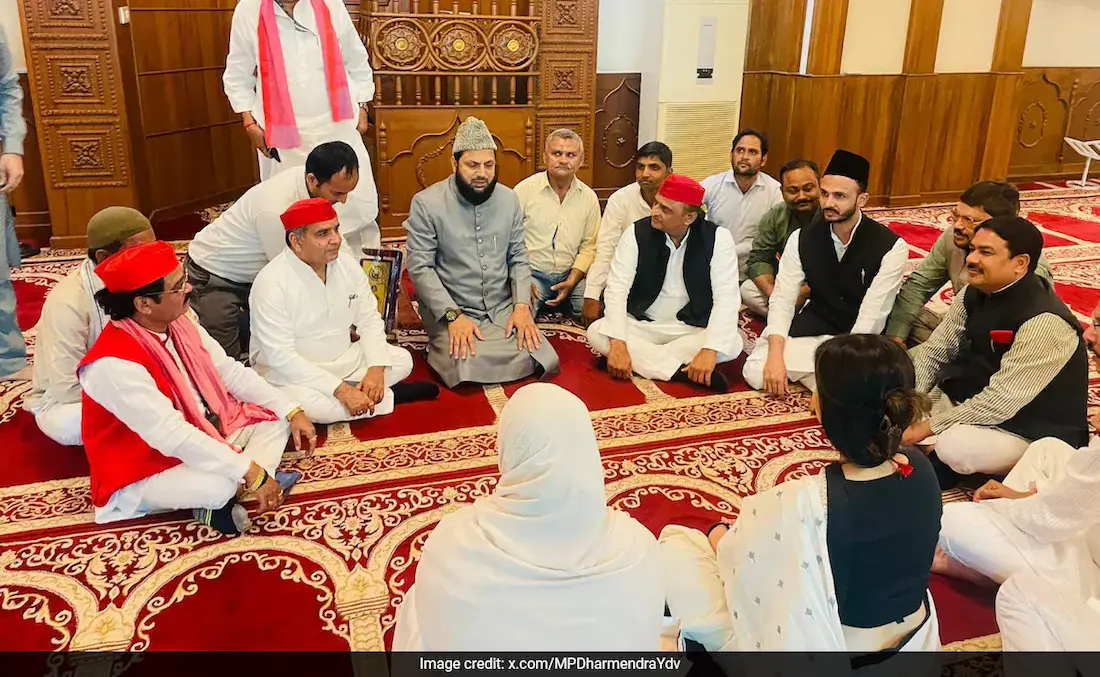
Maulana Rashidi’s sexist remarks on Dimple Yadav’s mosque visit trigger FIRs, protests, and a national debate on religion, gender, and political accountability
In a week already charged with political tension, a fresh controversy has erupted in India’s Parliament and media circles. At the center of the storm is Maulana Sajid Rashidi, President of the All India Imam Association (AIIA), whose remarks about Samajwadi Party MP Dimple Yadav have sparked outrage, protests, and a criminal investigation. The issue touches on religion, gender, politics, and the boundaries of public discourse making it one of the most volatile flashpoints in recent memory.
The Spark: A Mosque Visit and a Comment
The controversy began with a Samajwadi Party delegation’s visit to a mosque near Parliament on July 24, 2025. The group included Dimple Yadav, her husband Akhilesh Yadav, and other MPs. While the SP described the visit as a social courtesy, critics including Rashidi claimed it was a political meeting held in a religious space, violating Islamic norms.
During a televised debate, Rashidi made a sexist and inflammatory remark about Dimple Yadav’s attire, saying, “Look at her back. It is naked,” and criticized her for not covering her head with a pallu. The comment was widely condemned as misogynistic, inappropriate, and disrespectful to women, triggering a political firestorm.
FIR and Fallout
A First Information Report (FIR) was filed against Rashidi under multiple sections of the Bharatiya Nyaya Sanhita (BNS) and the Information Technology Act, including charges of outraging a woman’s modesty, promoting enmity, and disturbing communal harmony. The complaint, filed by SP leader Pravesh Yadav, accused Rashidi of inciting unrest and threatening the secular fabric of the nation.
In response, Rashidi remained defiant. He stated that he would only apologize if Akhilesh and Dimple Yadav first apologize for allegedly misusing the mosque for political purposes. He claimed his remarks were rooted in cultural and religious beliefs and insisted that the issue was being sensationalized to divert attention from the mosque meeting itself.
Parliament Protests and Political Reactions
The remarks prompted a protest by NDA MPs outside Parliament. Led by BJP leaders like Bansuri Swaraj, the protestors held placards reading “Nari garima par prahar, nahi karenge kabhi bhi sweekar” (We will never accept attacks on women’s dignity). They demanded accountability from the Samajwadi Party and condemned Rashidi’s comments as an insult to all women.
Meanwhile, Dimple Yadav welcomed the FIR, but questioned the BJP’s selective outrage. She pointed out that similar protests were absent during incidents of violence against women in Manipur and during Operation Sindoor, when BJP leaders allegedly made indecent remarks about a female army officer.
Religion, Politics, and Double Standards
Rashidi’s defense hinges on the claim that religious decorum was violated by holding political discussions in a mosque. He argued that mosques are sacred spaces and should not be used for political gain. He also challenged Dimple Yadav to demonstrate equal respect for Hindu traditions by performing an aarti in similar attire, suggesting that her actions were selectively disrespectful.
Critics, however, argue that Rashidi’s remarks were not about religious decorum but were deeply sexist and communal, targeting a woman for her clothing and presence in a religious space. SP MP Iqra Hasan condemned the comments, calling for a social boycott of Rashidi and asserting that no religious leader has the right to police a woman’s attire.
A Larger Narrative of Marginalization?
Rashidi framed the backlash against him as part of a broader attempt to suppress Muslim voices. He claimed he was being singled out for expressing religious concerns, while hate speech from other communities often goes unpunished. He also alleged that he had received threats from SP workers, including calls for violence, and vowed to stand by his beliefs—even repeating the same remarks if the situation arose again.
Final Thoughts: A Moment of Reckoning
This controversy is more than a clash of personalities, it’s a reflection of India’s complex intersection of religion, gender, and politics. It raises uncomfortable questions: Can religious norms be invoked to justify public commentary on a woman’s body? Should political parties be held accountable for their conduct in sacred spaces? And how do we ensure that freedom of expression does not become a shield for misogyny or communalism?
As the legal process unfolds and public debate intensifies, one thing is clear: this moment demands introspection—not just from Rashidi or the Samajwadi Party, but from India’s political and religious leadership as a whole.
Stay updated with the latest news on Rapido Updates. Keep yourself updated with The World, India News, Entertainment, Market, Automobile, Gadgets, Sports, and many more